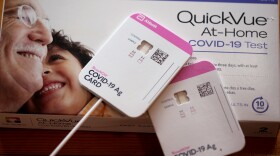
Mary Louise Kelly
Mary Louise Kelly is a co-host of All Things Considered, NPR's award-winning afternoon newsmagazine.
Previously, she spent a decade as national security correspondent for NPR News, and she's kept that focus in her role as anchor. That's meant taking All Things Considered to Russia, North Korea, and beyond (including live coverage from Helsinki, for the infamous Trump-Putin summit). Her past reporting has tracked the CIA and other spy agencies, terrorism, wars, and rising nuclear powers. Kelly's assignments have found her deep in interviews at the Khyber Pass, at mosques in Hamburg, and in grimy Belfast bars.
Kelly first launched NPR's intelligence beat in 2004. After one particularly tough trip to Baghdad — so tough she wrote an essay about it for Newsweek — she decided to try trading the spy beat for spy fiction. Her debut espionage novel, Anonymous Sources, was published by Simon and Schuster in 2013. It's a tale of journalists, spies, and Pakistan's nuclear security. Her second novel, The Bullet, followed in 2015.
Kelly's writing has appeared in the Wall Street Journal, The New York Times, The Washington Post, Politico, Washingtonian, The Atlantic, and other publications. She has lectured at Harvard and Stanford, and taught a course on national security and journalism at Georgetown University. In addition to her NPR work, Kelly serves as a contributing editor at The Atlantic, moderating newsmaker interviews at forums from Aspen to Abu Dhabi.
A Georgia native, Kelly's first job was pounding the streets as a political reporter at the Atlanta Journal-Constitution. In 1996, she made the leap to broadcasting, joining the team that launched BBC/Public Radio International's The World. The following year, Kelly moved to London to work as a producer for CNN and as a senior producer, host, and reporter for the BBC World Service.
Kelly graduated from Harvard University in 1993 with degrees in government, French language, and literature. Two years later, she completed a master's degree in European studies at Cambridge University in England.
-
Katherine Maher, president and CEO of National Public Radio, talks with NPR's Mary Louise Kelly about the White House proposal to eliminate federal funding for public media.
-
The U.S. should prepare for a spike in COVID cases this winter as more people gather indoors and infections already begin to rise in Europe, White House COVID-19 Response Coordinator Ashish Jha says.
-
Sick kids are crowding emergency rooms in parts of the country and some pediatric hospitals say they're running out of beds.
-
PFAS are all around us, so how do we navigate a world filled with harmful chemicals? We speak to an expert who guides us through what PFAS are, why they're a problem, and what can be done about them.
-
While the nation is reeling from the shooting in Uvalde, Texas, the Latino community is being hit particularly hard as they see the names and photos of the victims who look and sound like them.
-
Secretary of State Antony Blinken says the U.S. is planning "things that we have not done in the past" if Russia invades Ukraine. Where do things stand now, and what can the U.S. do at this point?
-
The omicron situation seems to be changing so fast that it's hard to figure out which activities are safe on any given day. Two experts guide us through how to make a smart risk budget.
-
Ten months after U.S. Capitol Police Sgt. Aquilino Gonell thought he'd die as Capitol rioters pummeled him, he's still working to recover his mental and physical health.
-
Harvard epidemiologist Michael Mina wants to increase availability of the at-home rapid tests the Biden administration is promoting. But he warns of a shortage without market competition.
-
Filipe Ribeiro of Doctors Without Borders Afghanistan talks to NPR about the future of the country's health care system under Taliban rule.










